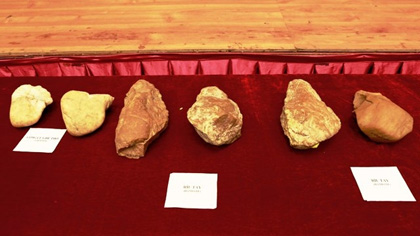Hand axes founded during the excavations
Scientists have discovered for the first time traces of early Paleolithic sites in Vietnam which date back 800,000 years through their recent archaeological excavations in Xuan An commune, An Khe town, Gia Lai province.
 |
| Early Paleolithic sites discovered for the first time in Vietnam |
The initial results of the excavations were introduced to the public at a press conference held in Hanoi on April 11 by the Vietnam Academy of Social Sciences.
The archaeologists assumed that the sites are linked with the time range of Homo Erectus, or “upright man” - the direct ancestor of early human.
They also found a cultural layer with evidence of human activities and stone tools such as choppers, axes and bifacial tools made of quartz and quartzite.
The discovery is likely considered the most ancient landmark on the appearance of humans and their culture in Vietnam so far, making Vietnam part of a few countries that are included on the map of the appearance and evolution of humans.
The excavations were conducted under the framework of an international co-operation programme for the 2015-2019 period between the Institute of Archaeology under the Vietnam Academy of Social Sciences and the the Institute of Archaeology and Ethnography under the Russian Academy of Sciences (Novosibirsk).
The preliminary findings are being processed and preserved for fundamental research, contributing to the compilation of the national history book while opening prospects for further international co-operation programmes on the ancient history of humans.
(Source: NDO)
 về đầu trang
về đầu trang






